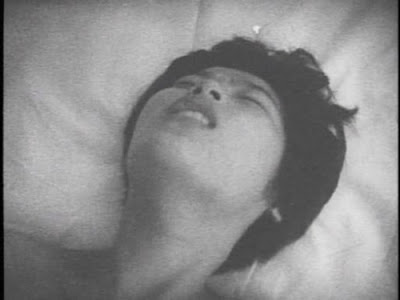Released in 1974
Directed by Kazuo Hara
Directed by Kazuo Hara
Storyline - In this intensely intimate documentary, filmmaker Kazuo Hara takes on a very difficult subject: his former lover, Takeda Miyuki. A feminist bisexual in 1970s Japan, Miyuki is a maverick in a rigid society driven by convention. As much a participant in this film as he is the filmmaker,
Hara follows Miyuki to Okinawa and documents her uncommon life as his feelings unravel in front of the camera. As Hara himself confessed, "I like to make something happen and then shoot it." With its grainy black and white scenes and its out-of-synch sound, Extreme Private Eros: Love Song 1974 creates the illusion of a home movie, but its intimacy pushed the bounds of the documentary cinema in Japan.
Gokushiteki erosu: Renka 1974 (Extreme Private Eros : Love Song 1974) was shot over several years, mostly in handheld b&w and often with out-of-synch sound, this raw confessional has Hara following his ex-wife, 26-year-old radical feminist Miyuki Takeda. The two lived together for three years and share a child, and this 93-minute documentary captures their post-break-up relationship and her new life without him. This was a brutal dose of reality for notoriously-private Japanese viewers to swallow, as it matter-of-factly tackles heartache, sex, insecurities, gender politics, and even on-camera childbirth.
Beginning in 1972, Miyuki and her child have moved to Okinawa, and Hara stays with her for a few turbulent days. During Miyuki's travels, her barfly girlfriends provide a bleak peek into Okinawa's skankiest nightclubs and their resident sluts, such as 14-year-old Chichi, who prefers funkadelic-dressed American G.I.'s to junior high. Later Miyuki shacks up with a black G.I. who can barely speak Japanese, but has no trouble getting her pregnant (and in a touching family-phone-call moment, Miyuki's mother urges her to dispose of it).
And when she misguidedly tries to distribute pamphlets to the local prostitutes, she's nearly beaten up. On top of that, Hara continually interrogates his ex, he begins crying on camera, and if he can add to the on-screen tension, he does -- like recruiting his current (much cuter) girlfriend Sachiko to interview increasingly-bitter Miyuki.
Moving back to Tokyo in '73, Miyuki works at a "birth commune" for new mothers. And when she has her baby, Hara is there with his trusty camera, as she delivers it at home without any help whatsoever. Although the entire sequence is out-of-focus, it's quite a sight; one long, uncut shot of Miyuki laying on the floor, spread-legged, squeezing out her "mixed blood" child onto the ground.
This insanely intimate document never flinches, as Miyuki verbally shames her infant son for looking and acting like his father, and Hara's narration continually criticizes Miyuki's screwed-up lifestyle. Sneaky Hara also captures some dialogue without Miyuki's apparent knowledge, such as a nasty conversation with Sachiko, as she insults everything about her ex, including his lousy bedroom prowess.
Hara was blasted by critics when this was released and I can understand why. I've dealt with ex-girlfriends and it can be a tense scene -- but I'd never dream of filming it for posterity!
This Love Song is an emotionally scalding yet absorbing cinematic open wound.







No comments:
Post a Comment